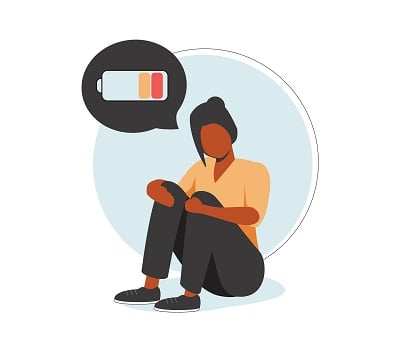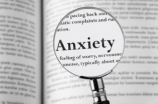Anticipatory Anxiety: Bleeding Before You Are Cut
Anticipatory Anxiety: Bleeding Before You Are Cut

Our newest book, Overcoming Anticipatory Anxiety—the third volume of a self-help trilogy—takes aim at the anxiety we experience prior to contacting something we fear or abhor.
Anticipatory anxiety is worry about the future, the fear that bad things might happen or that you might become unable to successfully accomplish what you set out to do. It is the anxiety we feel when we are anticipating a difficult decision, action or situation. It is how we feel when we buy into our own creative worry stories. It is the expectation of distress accompanied by a push to avoid. Anticipatory anxiety seems to predict danger; it feels like a warning.
We think of anticipatory anxiety as a third layer of fear:
First, we can be afraid of something. Think, for example: ‘I am scared of a bee.”
Second, we can be afraid of being afraid---this is sometimes called the fear of fear, or panic. Think of this example: “If I see a bee, I might get so frightened that I have a panic attack and then lose control or have a heart attack.”
Finally, we get to the third level of fear. We can be afraid of being afraid of being afraid. This is not as complicated as it sounds; it goes like this: “I am miserable even thinking about camping next week because I might see a bee and have a panic attack, lose control and do something crazy. Maybe I should cancel the camping trip”.
This third layer of fear is a powerful motivator of avoidance. Catastrophic predictions--like having a panic attack, making a fool of yourself, or damaging a relationship—can lead to incapacitating anxiety that stops you from proceeding.
Anticipatory anxiety involves worry about—and the urge to avoid—not only anxiety or panic, but also disgust, anger, shame, regret, humiliation, becoming overwhelmed, or any other unwanted emotion.
If you are worried that you might have a panic attack in a particular situation, anticipatory anxiety may start hours, days or even weeks before the scheduled event. If you are deciding if it is safe to meet a new person, use a public bathroom or ignore a brief sensation or thought, anticipatory anxiety is the dread you feel when you “try on” that activity or decision and scare yourself by imagining all the ways things could go badly.
Anticipatory anxiety varies widely in appearance: as phobic avoidance, fear of being alone, performance anxiety, or insomnia. It can look like the elaborate planning that someone with OCD does to avoid contamination, the agony of waiting for medical test results or the haunting fear of the return of an unwanted intrusive thought.
Anticipatory anxiety drives the compulsions that define obsessive-compulsive disorder and related conditions. It is anticipatory anxiety (“I won’t be able to stand it if”...) that pushes people to perform the mental rituals and behavioral compulsions to reduce the immediate discomfort caused by the obsession.
Anticipatory anxiety might be expressed as a fear of going to parties or restaurants or travel, or any encounter you believe will be challenging. Dreading being alone at night might stem from scary narratives of sudden illness or danger. Anticipatory anxiety about imagined relationships might be why you avoid dating. Anticipatory anxiety about possibly getting fired might make you “sick” every morning before you leave for work.
Anticipatory anxiety can occur as tension in the body without awareness of specific worries. It can be the primary driver of chronic hyperventilation which is a set-up for panic attacks. Headache or chronic gastrointestinal problems such as diarrhea, nausea, or vomiting might be directly traced to it.
Anticipatory anxiety is the primary driver of GAD (generalized anxiety disorder), a tendency towards unproductive and excessive worrying. (Our earlier book Needing to Know for Sure describes this phenomenon in detail.) The anxious “what if” of GAD is anticipatory anxiety.
Anticipatory anxiety develops out of an overactive imagination or from conditioned responses to memories. It can be driven by a trait called anxiety sensitivity (the fear of mind and body manifestations of anxious arousal). It can also emerge from a depressed mood state. Or it can find its origins in beliefs about one’s own inability to cope with novelty or challenge.
Effective treatment of anticipatory anxiety is targeted at the factors which maintain it. As always, too much thinking is not solved by more thinking.
Successful therapy aims for a shift towards the senses, a modification of attitude, and a change in one’s relationship with inner experience. These include gently redirecting the attention to the present moment rather than the imagined future while allowing for and not struggling against the experience of anxiety.
Metacognitive factors which maintain anxiety (such as how we can be hijacked by our own imagination) need to be addressed. And escape planning, ruminative entanglement with worries, and other forms of avoidance such as empty self-reassurance are discouraged.





















